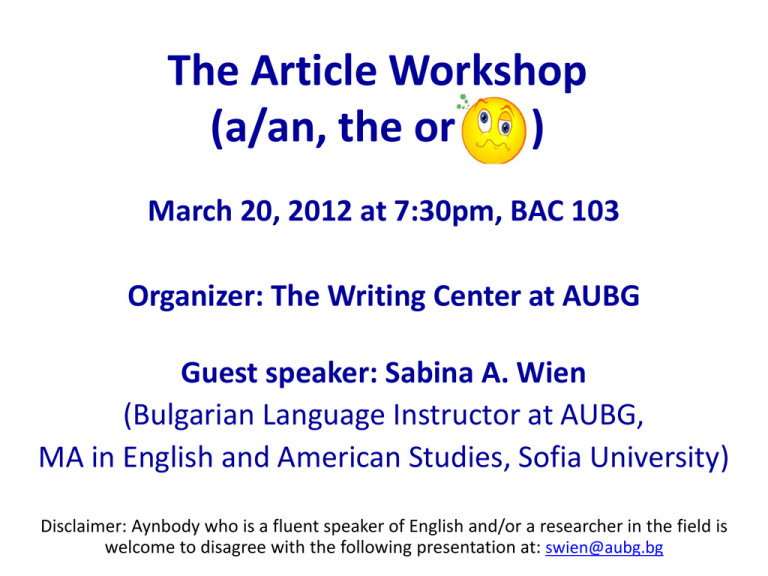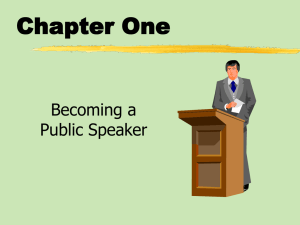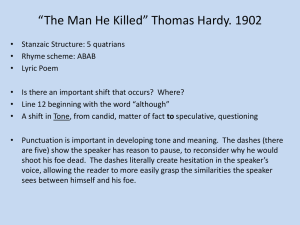
The Article Workshop
(a/an, the or
)
March 20, 2012 at 7:30pm, BAC 103
Organizer: The Writing Center at AUBG
Guest speaker: Sabina A. Wien
(Bulgarian Language Instructor at AUBG,
MA in English and American Studies, Sofia University)
Disclaimer: Aynbody who is a fluent speaker of English and/or a researcher in the field is
welcome to disagree with the following presentation at: swien@aubg.bg
Types of Articles in All Languages
The good news:
There are only 3!
- indefinite article
- definite article
- zero article (= no article)
Which Languages
Have
Which Article(s)?
http://amor.cms.huberlin.de/~h2816i3x/Lehre/2006_VL_Typolo
gie/Typologie_04_Definitheit.pdf
(look at the world maps on page 1(right)
annd page 2 (left)
otherwise, the source is in German!)
Types of Articles
in my Mother Tongue: Bulgarian
- definite article: yes!
(differs in gender and number)
- indefinite article: no!
(it‘s a matter of a long discussion, though)
- zero article: Pardon me???
(BG linguists don‘t yet talk about it)
Types of Articles
in your Mother Tongue: …
You tell me!
Types of Articles in English (1):
What do you know so far?
You have 2 minutes
to discuss with your neighbor.
Then you can share with everybody.
Types of Articles in English (2)
The bad news:
English has them all!
- definite article: the
- indefinite article: a/an
- zero article: ø (= i.e. no article)
Types of Articles in English (3)
The worse news:
1. The pronunciation of the!
2. The choice betwen a and an!
The pronunciation of the (1):
the Theory
You have 1,5 minutes
to discuss with your neighbor.
Then you can share with everybody.
the
-[ðə]: before a consonant
- [ði]: before a vowel
The pronunciation of the (2a):
the Practice
the: [ðə] or [ði] in the following words?
Take 2 minutes and split into 2 columns.
axis
equivalent
upgrade
X-ray
image
lede*
wave
rhythm
quota
journal
university
gene
income
yield
hour
* Look up ‛a lede‘: http://www.merriam-webster.com/dictionary/lede
The pronunciation of the (2b):
the Practice
the: [ðə] or [ði] in the following words?
[ði]
[ðə]
axis
equivalent
image
income
upgrade
hour
university
X-ray
lede
gene
rhythm
yield
quota
journal
wave
The Choice between a and an (1):
the Theory
You have 1,5 minutes
to discuss with your neighbor.
Then you can share with everybody.
a [ə]: before a consonant
an [ən]: before a vowel
The Choice between a and an (2a):
the Practice
a: [ə] or [ən] in the following words?
Take 2 minutes and split into 2 columns.
axis
equivalent
upgrade
X-ray
image
lede
wave
rhythm
quota
journal
university
gene
income
yield
hour
The Choice between a and an (2b):
the Practice
a or an in the following words?
an
axis
equivalent
image
income
upgrade
hour
X-ray
a
lede
gene
rhythm
yield
quota
journal
wave
university
Problems?
[ju] – a vowel or a consonant?
university [ˌjuːnɪˈvɜː(r)səti]*
the university [ði juni’və:(r)siti]
(i.e. [ju] treated as a vowel)
a university [ə juni’və:(r)siti]
(i.e. [ju] treated as a consonant)
* Oxford Advanced Learner‘s Dictionary
(http://oald8.oxfordlearnersdictionaries.com/dictionary/university)
The Use of the Definite Article,
the Indefinite Article,
and the Zero-article
in Standard British/ American
English
Some Linguistics Theory (1)
(pls, apologize)
- Spech Act Theory
by the British linguist/philosopher of
language J. L. Austin
(major book: How to Do Things With Words, 1962)
- further developed by the US philosopher
J. R. Searle (http://socrates.berkeley.edu/~jsearle)
Some Linguistics Theory (2):
What is a speech act?
“We perform speech acts when we offer an apology, greeting,
request, complaint, invitation, compliment, or refusal. A
speech act is an utterance that serves a function in
communication. A speech act might contain just one word, as
in "Sorry!" to perform an apology, or several words or
sentences: "I’m sorry I forgot your birthday. I just let it slip my
mind." Speech acts include real-life interactions…” *
* http://www.carla.umn.edu/speechacts/definition.html
(The Center for Advanced Research
on Language Acquisition at the University of Minnesota)
Some Linguistics Theory (3):
What is the minimum number of
participants in an ideal speech act?
TWO:
one SPEAKER (S)
one LISTENER (L)
The two participants can exchange their roles, of course.
The Use of the: from Theory … (1)
You have 2 minutes
to discuss with your neighbor:
When do we use the in English?
What rules do you know?
Then you can share with everybody.
The Use of the: from Theory … (2)
(what I assume you know from school)
- with unique nouns (ex. the Earth, the Sun)
- when the noun has already been mentioned in
the previous sentence
- the Netherlands, the Canary Islands, the Persian
Gulf, the Danube, the Black Sea, the West, etc.
The Use of the: … to Practice (1)
Do these rules always work? Let’s check.
First example:
“The Earth could be getting a second sun,
at least temporarily.” *
(* Two Suns? Twin Stars Could Be Visible From Earth By 2012:
http://www.huffingtonpost.com/2011/01/20/two-suns-twin-stars_n_811864.html)
The Use of the: … to Practice (2)
Do these rules always work?
Second example:
“Humpty Dumpty sat on a wall,
Humpty Dumpty had a great fall.
All the King's horses and all the King's men
Couldn't put Humpty together again.” *
(* I. Opie and P. Opie, The Oxford Dictionary of Nursery Rhymes (Oxford: Oxford University Press,
1951, 2nd edn., 1997), pp. 213-5, online in: http://www.rhymes.org.uk/humpty_dumpty.htm)
The Use of the Speech Act Theory in
relation with Article Use in General
The decision when to use the definite article
and the indefinite article
depends on whether the SPEAKER (S) and/or
the LISTENER (L)
know what is specifically referred to, whether S
and/or L can identify once particular person/
thing or one particular group of people/things
which are referred to.
The Use of the: from Practice … (1a)
in an attempt to get more academic
March 20, 10:16
Student: Thank you for the lecture, professor!
Professor: My pleasure.
Both the speaker (Student) and the listener (the
Professor) are thinking about the same specific
thing, i.e. the lecture which has just finished.*
* These are strictly my interpretiations, i.e. don‘t treat them as a universal truth, please.
The Use of the: from Practice … (1a)
in an attempt to get more academic
April 27th, 10:16
Student: Thank you for the lectures, professor!
Professor: My pleasure.
Both the speaker (Student) and the listener (the
Professor) are thinking about the same specific
things, i.e. the lectures during the Spring
Semester 2012 which just have/has finished.*
* These are strictly my interpretiations, i.e. don‘t treat them as a universal truth, please.
The Use of the: from Practice … (2a)
in an attempt to get more academic
March 19, 2012
Elena: Yesterday I had ENG 101. The professor was
amazing.
Ivan: No wonder. We are at AUBG.
Both the speaker (Elena) and the listener (Ivan)
know that ENG is a class, and in a class there is
(usually) a professor involved. i.e. no need to
mention this popular fact in advance. *
* These are strictly my interpretiations, i.e. don‘t treat them as a universal truth, please.
The Use of the: from Practice … (2b)
in an attempt to get more academic
April 3d, 2012
Elena: Yesterday I watched “Grease”. The dances were
fantastic.
Ivan: No wonder. Skerdi Buhuri, Nagima Iskakova,
Mariya Marinova, and Krasen Dimov are the
choreographers.
Both the speaker (Elena) and the listener (Ivan) know
that “Grease“ is a musical and as such it involves
dancing. i.e. no need to mention this popular fact. *
* These are strictly my interpretiations, i.e. don‘t treat them as a universal truth, please.
The Use of the: from Practice … (3a)
in an attempt to get more academic
March 26th, 2012
Elena: We’ll be cleaning and re-painting the Zoo in
Blago during the Environment Week 2012.
Ivan: I‘ll surely join.
Both the speaker (Elena, an active BCC member) the
listener (Ivan, a potential BCC member) agree on the
fact that there is only one zoo in Blago, i.e. they share
the knowledge that the zoo in Blago is unique. *
* These are strictly my interpretiations, i.e. don‘t treat them as a universal truth, please.
The Use of the: from Practice … (3b)
in an attempt to get more academic
Anytime at AUBG
AUBG Professor 1: The AUBG student is a strange species.
AUBG Professor 2: Tell me about it.
Both the speaker (AUBG Professor 1), and the listener
(AUBG Professor 2) agree to unite all AUBG students
into a species which they call THE AUBG student. i.e.
THE AUBG student is a symbolic figure which unites
the typical characteristic features of all AUBG
students: generic function of the.*
* These are strictly my interpretiations, i.e. don‘t treat them as a universal truth, please.
The Use of the: from Practice … (3c)
in an attempt to get more academic
Anytime at AUBG before May 31st, 2012
Elena: The Wiens are expecting a baby.
Ivan: Really? I didn‘t know that.
the + last name = the whole family.
The Use of the: from Practice … (3d)
in an attempt to get more academic
Anytime at AUBG before May 31st, 2012
Elena: The best student at AUBG is called (the name has
been blurred for reasons of confidentiality).
Ivan: Are you joking? A am the best student at
AUBG.
the + superlative = the a unique person/thing or
group of people/things
The Use of the: … to Theory (1)
the is used:
- with both singular and plural nouns
- when both the speaker and the listener
mean/understand a specific noun/ specific nouns; the
noun refers to a particular person/ thing or a particular
group of people/things
- when both the speaker and the listener agree that for
them, in this special situation something is unique
- in generalizations
The Use of the: … to Theory (2)
the is always used with:
• names of rivers, oceans and seas: the Nile, the Pacific
• mountain ranges: the Andes or the Rockies
• points on the globe: the Equator, the North Pole
• geographical areas: the Middle East, the West
• deserts, forests, gulfs, and peninsulas: the Sahara, the
Persian Gulf, the Black Forest, the Iberian Peninsula
• island chains like the Aleutians, the Hebrides, or the
Canary Islands
• the Netherlands, the Philippines, the Dominican
Republic, the Czech Republic, the United States, the
Islamic Republic of Iran*
• last names when you mean the family: the Hiltons, the
Jacksons
(* See Sources: Using Articles)
The Use of a/an: from Practice … (1a)
in an attempt to get more academic
March-April 2012 at AUBG
Student 1: I really want a WAT job.
Student 2: Any job? Really?
The speaker (Student 1) has applied for all possible
jobs the WAT progam offers and he/she is ready to
accept any WAT job as long as it is in the USA. *
* These are strictly my interpretiations, i.e. don‘t treat them as a universal truth, please.
The Use of a/an: from Practice … (1b)
in an attempt to get more academic
April 27th, 10:16
Student 1: Yesterday I was in ‟Underground“ and I saw
a girl. I think I am in love.
Student 2: How did she look? Was she from AUBG?
The speaker (Student 1) has most probably seem more
than one girl in ‟Underground“. He actually means a
specific girl but the listener (Student 2) cannot yet
identify which girl Student 1 means. That is why Student
2 is asking for more details. *
* These are strictly my interpretiations, i.e. don‘t treat them as a universal truth, please.
The Use of a/an: from Practice … (1c)
in an attempt to get more academic
April 27th, 10:16
AUBG Student 1: An AUBG Professor is a strange species.
AUBG Student 2: Tell me about it.
Both the speaker (AUBG Student 1), and the listener
(AUBG Studnet 2) agree to unite all AUBG professors
into a species which they call THE AUBG Professor. i.e.
THE AUBG Professor is a symbolic figure which unites
the typical characteristic features of all AUBG
professors: generic function of a/an. *
* These are strictly my interpretiations, i.e. don‘t treat them as a universal truth, please.
The Use of a/an: … to Theory
a/an is used:
- only with singular, count nouns
- when the speaker does not mean a specific, a
particular person/ thing or group of people/things,
i.e. = any
- when the listener cannot identify which specific
person/ thing the speaker has in mind
- in generalizations
The Use of the Zero Article:
from Practice … (1a)
in an attempt to get more academic
anytime, anywhere
- I like chocolate.
- I like cookies.
- Love is all around.
The Use of the Zero Article:
from Practice … (2a)
in an attempt to get more academic
anytime, anywhere
- My name is Professor.
- I speak English. I am Bulgarian.
- I come from Russia, Turkmenistan.
- I like playing rugby.
-This semester I am not taking mathematics.
The Use of the Zero Article:
from Practice … (2b)
in an attempt to get more academic
anytime, anywhere
- I go to school every day.
- She is 18, she is at college already.
-I have to go to work now.
- He is in hospital.
- She is in prison.
- Let‘s go to church.
- His father is at sea.
The Use of the Zero Article:
from Practice … (2c)
in an attempt to get more academic
anytime, anywhere
- I am in bed./ I‘m going to bed already
- Let‘s go home./ Is he at home?
- Which is the best restaurant in town?
The Use of the Zero Article: … to Theory
(1)
the zero article is used:
- with non-count nouns (i.e. singural, of course)
- abstract nouns (i.e. singular, of course)
- with plural nouns in generalizations
- when we mean the institution, not the building, ex.
She is in prison. (i.e. is a prisoner) vs. She is in the
prison, not at home. (i.e. she is visiting a prisoner)
The Use of the Zero Article: … to Theory
(2)
the zero article is always used
(i.e. never use a/an or the):
- animals, toys
- names of people,
-names of languages and nationalities:
- names of countries (see exceptions)
- names of sports
- names of academic subjects
- some set phrases
I am afraid I have kept you too long, therefore:
Thank you for your patience!
Thank you for your cooperation!
Enjoy the use of the articles in English,
and don‘t forget the professor who
reminded you of all those useful things in
relation with the ARTICLES IN ENGISH!
My AUBG profile: http://www.aubg.bg/facultyPopup.aspx?fid=151
Paper Sources (available at the AUBG Panitza Library: http://www.aubg.bg/library)
Schrampfer Azar, Betty; Hagen, Stacy A.: Understanding and Using English Grammar. Pearson/Longman.
2009. 4th ed., pp. 100-134, 476-481. (recommended)
Yule, George: Oxford Practice Grammar (Advanced). Oxford University Press. 2006. Call Nr.: PE 1112. Y856.
2010, pp. 68-81, 229-233, 265. (recommended)
Eastwood, John: Oxford Practice Grammar (Intermediate). Oxford University Press 2006. Call Nr.: PE 1128
.E26. 2009, pp. 196-215, 398-401. (recommended)
Greenbawm, Sidney: The Oxford English Grammar. Oxford University Press. 1996, pp. 164-165, 243-246,
621, 625, 635. (rather theoretical)
McArthur, Tom (ed.): The Oxford Companion to the English Language. Oxford University Press 1992, pp. 8283. (rather theoretical)
Online Sources (as of March 20, 2012):
Using Articles (by Paul Lynch, Allen Brizee, Elizabeth Angeli @ Purdue Online Writing Lab):
http://owl.english.purdue.edu/owl/resource/540/01/ (recommended)
Article Usage (by John R. Kohl, The Writing Center at Rensselaer):
http://www.rpi.edu/web/writingcenter/esl.html (recommended)
Teaching Definite and Indefinite Articles (Lanternfish ESL, a group of ESL teachers in Asia and North
America): http://bogglesworldesl.com/indefinitearticles.htm (rather simplistic)
Dimensionen grammatischer Variation: Eine Einführung in die Sprachtypologie. Definitheit, Indefinitheit,
Spezifizität, Generizität [Dimensions of Grammatical Variation: An Introduction to Language Typology.
Definiteness, Indefiniteness, Specificity, and Genericness (by Manfred Krifka @ Humboldt University in
Berlin):
http://amor.cms.hu-berlin.de/~h2816i3x/Lehre/2006_VL_Typologie/Typologie_04_Definitheit.pdf (strictly
linguistic, in German)










